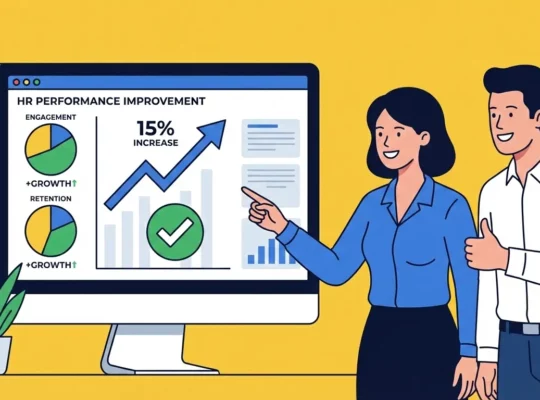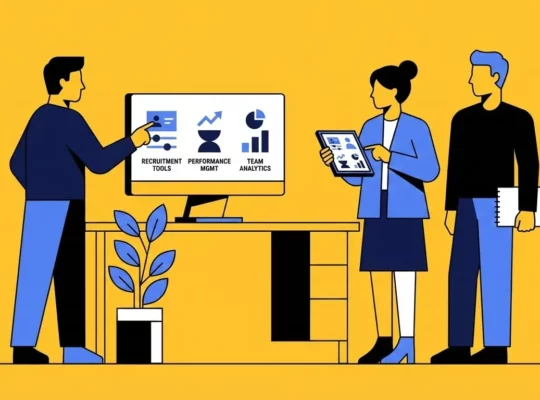Getting to know your employees is the cornerstone of a thriving workplace culture. When you take time to understand your team on a deeper level, you’re not just fostering connections—you’re also setting the stage for better employee engagement and a more productive work environment. At Review.jobs, we believe that knowing your employees beyond their job roles can unlock creativity, boost morale, and build stronger teams. Let’s dive into why structured employee interactions matter and how you can make the most of them.
Table of Contents
- Why Knowing Your Employees Matters
- Structuring Employee Conversations
- 20 Must-Ask Questions to Know Your Employees
Why Knowing Your Employees Matters
Getting to know your employees goes far beyond learning their job titles and responsibilities—it’s about understanding the people behind the roles. When organizations prioritize understanding their team members on a deeper level, it creates a strong foundation for trust, communication, and collaboration. Here are 6 reasons why it matters and the profound impact it can have on your company:
1. Enhancing Workplace Culture
Understanding your employees’ personalities, values, and preferences contributes to building a positive work environment where people feel valued. When employees feel that their individuality is acknowledged, they’re more likely to bring their authentic selves to work. This fosters:
- Open Communication: Employees are more likely to share ideas and concerns when they feel respected.
- Stronger Relationships: Personal connections between employees lead to teamwork that feels natural and effective.
- Inclusion: Understanding differences in backgrounds, beliefs, and experiences helps create a more inclusive workplace where everyone thrives.
Example: A manager who learns that a team member prefers verbal feedback over written reports can tailor their communication style, ensuring the employee feels heard and supported.
2. Improving Employee Engagement
Employees who feel understood are more likely to stay engaged with their work. Engagement directly correlates with productivity, loyalty, and overall job satisfaction. According to a study by Gallup:
- According to Gallup’s State of the Global Workplace report, engaged teams show 21% greater profitability and 17% higher productivity compared to disengaged teams.
- A Society for Human Resource Management (SHRM) report shows that engaged employees take 41% fewer sick days, reducing absenteeism.
By investing time to know your employees better, you create an environment where they feel inspired to give their best effort and a culture of employee motivation.
3. Boosting Retention Rates
Employees who feel valued are significantly less likely to leave their positions. Retaining skilled team members not only reduces recruitment costs but also ensures continuity and growth within the organization. When employees believe their personal and professional growth is a priority, they’re more likely to remain committed to your company.
Statistics:
- 87% of employees who feel personally valued by their manager are less likely to seek new job opportunities.
- Companies with high employee engagement have 59% lower turnover rates than those with low engagement.
4. Driving Innovation and Collaboration
Knowing your employees’ skills, hobbies, and aspirations can uncover hidden talents that enhance teamwork and spark creativity. Employees are more likely to collaborate effectively when they feel connected to their peers and managers.
Example: A manager who knows that a team member has graphic design skills might ask them to contribute to a new marketing project, leading to innovative solutions that wouldn’t have surfaced otherwise.
5. Aligning Goals and Career Aspirations
Understanding your employees’ career goals and aspirations allows you to align their personal ambitions with the company’s objectives. By creating opportunities for growth and development, you ensure that employees stay motivated and invested in their roles.
Actionable Tip: During regular check-ins, ask questions like, “What skills do you want to develop in the next year?” or “What does your dream project look like?” Use these insights to offer relevant training or assign stretch projects.
6. Building Trust and Recognition
Employees are more likely to trust a manager or leader who takes the time to know them on a personal level. This trust forms the basis for meaningful recognition and appreciation, which, in turn, boosts morale.
Example: Knowing an employee’s favorite way to celebrate milestones—whether it’s public acknowledgment, a handwritten note, or a team lunch—makes recognition more impactful and memorable.
Structuring Employee Conversations
Structured employee conversations are pivotal in creating a work environment where employees feel valued and understood. By setting an intentional framework for dialogue, you can unlock deeper insights into your team while fostering a culture of feedback and engagement. Here’s why and how structured conversations can transform your workplace:
Why Structure Matters
Unplanned or surface-level conversations can feel transactional and may fail to address deeper employee concerns or aspirations. On the other hand, structured conversations:
- Encourage Purposeful Dialogue: They steer discussions toward meaningful topics, ensuring both parties leave the conversation with actionable takeaways.
- Build Trust and Openness: Employees are more likely to share honest feedback when conversations feel deliberate and thoughtful.
- Improve Employee Engagement: Structured check-ins reinforce that the organization values its people, leading to increased job satisfaction and commitment.
Example: Imagine an onboarding process where managers ask a new hire structured questions about their career goals and preferred work environment. This can set a positive tone for their experience and help tailor their role to align with their strengths.
Contexts for Structured Conversations
Different workplace settings require unique approaches to structured employee conversations. Let’s explore key scenarios where structured questions can have the most impact:
Onboarding Processes
The first days and weeks of an employee’s journey are critical. Structured conversations during onboarding can help employees acclimate quickly and feel part of the team. Questions could cover:
- Personal interests to integrate them socially.
- Career aspirations to align goals with company objectives.
Regular One-on-One Meetings
Scheduled one-on-one check-ins are ideal for tracking employee progress and addressing any concerns. Topics could include:
- Job satisfaction.
- Challenges faced in their current role.
- Support needed for career growth.
Tip: Use a consistent format for these meetings to ensure no important topic is overlooked.
Team-Building Activities
Structured conversations during team-building exercises help create bonds between colleagues. These can include:
- Fun icebreaker questions to set a relaxed tone.
- Problem-solving tasks that encourage collaboration.
Remote Team Catch-Ups
For distributed teams, structured virtual conversations help bridge the gap caused by physical distance. Topics might focus on:
- How employees feel about their remote work environment.
- Suggestions for better virtual communication.
Example: During a remote team call, asking, “What’s one thing you’ve enjoyed about working remotely?” can reveal positive practices worth adopting company-wide.
Balancing Formality and Comfort
While structured conversations aim to create a purpose-driven dialogue, maintaining a balance between formality and comfort is crucial.
- Set a Relaxed Tone: Avoid making employees feel like they’re being interrogated. Begin with casual or lighthearted questions to break the ice.
- Be Consistent but Flexible: Use a general framework but adapt based on the situation or employee’s personality.
- Ensure Privacy: Conduct sensitive conversations in private settings to encourage openness.
Effective Formats for Structured Conversations
Depending on the goals of the conversation, you can use different formats to make them productive and engaging:
| Format | Best For | Example Question |
| One-on-One Meetings | Performance reviews, career planning | “What skills would you like to develop next?” |
| Group Discussions | Team-building, brainstorming | “What’s one change that would improve teamwork?” |
| Surveys and Questionnaires | Gauging employee satisfaction and engagement | “How valued do you feel in your current role?” |
| Informal Check-Ins | Casual updates, building rapport | “What’s your favorite part of the day?” |
Structured Conversations with Review.jobs
Incorporating an employee review management platform like Review.jobs revolutionizes how organizations connect with their workforce. By providing tools such as customizable questionnaires and real-time feedback surveys, Review.jobs ensures that employee conversations are structured and impactful. These features facilitate the collection of actionable insights while fostering a secure and transparent communication environment.
For instance, leveraging pulse surveys to assess employee morale before a one-on-one meeting enables managers to address the most pressing concerns directly. This data-driven approach underscores an organization’s commitment to employee well-being and paves the way for meaningful dialogue.
Features of Review.jobs that Enhance Communication
- Customizable Questionnaires: Tailor surveys to gather specific insights that align with organizational goals.
- Real-Time Feedback: Utilize instant feedback channels to stay updated on employee sentiments.
- Anonymous Reviews: Provide a safe space for employees to share honest opinions without fear of reprisal, ensuring authenticity.
- Advanced Analytics: Analyze sentiment trends and create actionable plans based on comprehensive feedback data.
- Centralized Dashboard: Streamline review management and communication processes through an intuitive interface.
20 Must-Ask Questions to Know Your Employees
Here’s a curated list of questions categorized for different settings:
Personal Insight Questions
- What’s your favorite hobby or pastime?
- Who inspires you the most in life?
- What’s a unique skill you have that most people don’t know about?
- If you could learn a new skill instantly, what would it be?
- What’s one thing on your bucket list that you haven’t done yet?
Professional Insight Questions
- What do you enjoy most about your role?
- What are your long-term career goals?
- What’s the most impactful project you’ve worked on?
- What kind of work environment helps you thrive?
- What’s one challenge you’ve overcome in your career, and what did you learn from it?
Fun and Lighthearted Questions
- If you could live anywhere in the world, where would it be?
- What’s your guilty pleasure TV show or movie?
- If you could have any superpower, what would it be and why?
- If you could only eat one meal for the rest of your life, what would it be?
- What’s your favorite childhood memory?
Team-Building Questions
- What’s your favorite way to spend a weekend?
- Who would you invite to your dream dinner party?
- What’s the best piece of advice you’ve ever received?
- What’s one thing you appreciate most about your team?
- What’s your go-to strategy for solving a tough problem with a team?
These questions blend personal, professional, and fun themes, making them versatile for any context and fostering deeper connections within your team.
Getting to know your employees isn’t just about asking questions—it’s about fostering trust, showing appreciation, and creating a work environment where everyone feels valued. Platforms like Review.jobs make this process seamless, helping you build stronger, more connected teams. Ready to get started? Dive into these questions and explore how Review.jobs can boost your workplace culture.





